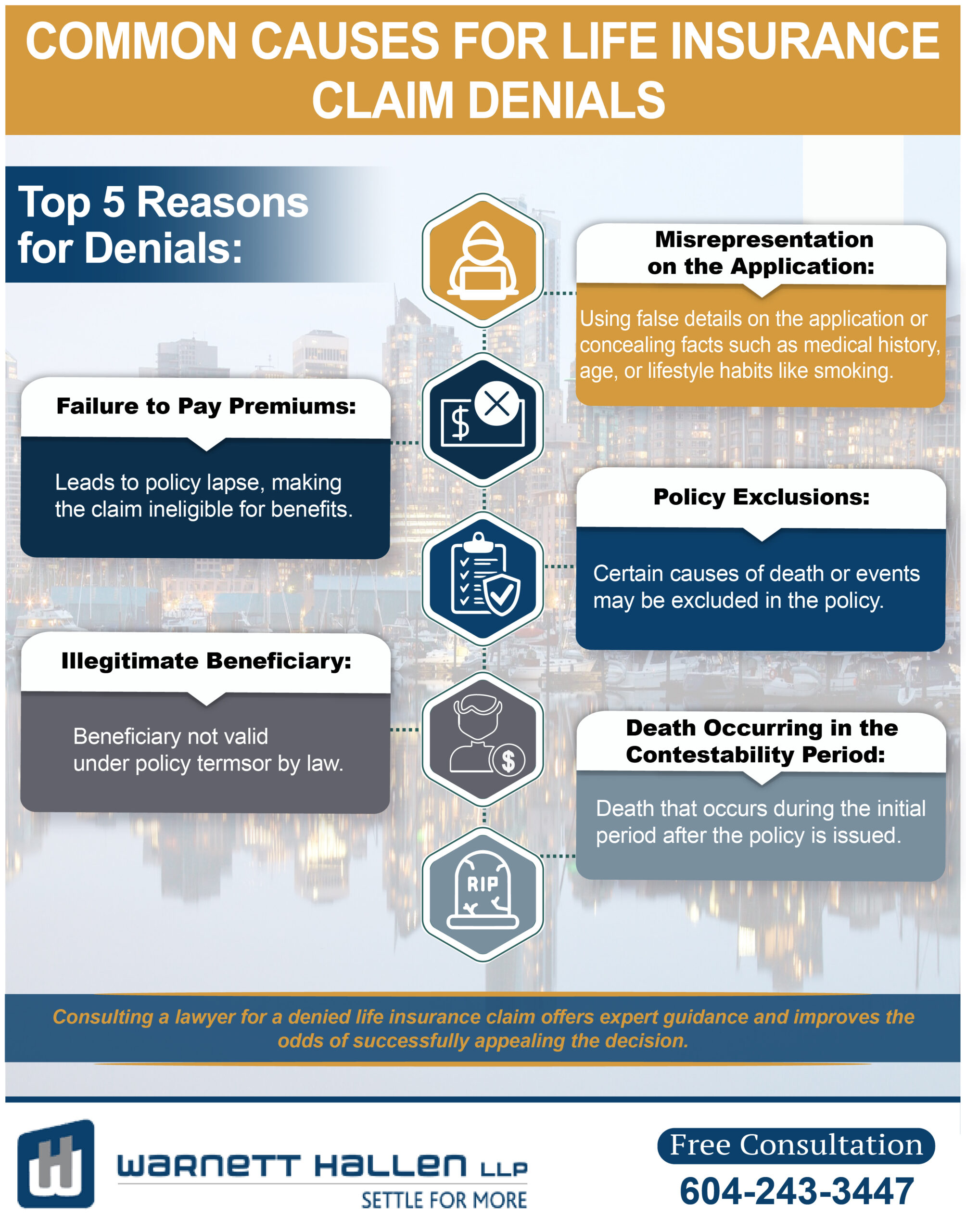Disclaimer: Since May 1, 2021, British Columbia operates under a no-fault insurance system for motor vehicle accidents. Under this system, compensation for injuries and losses is handled through your own insurance provider (typically ICBC) regardless of who is at fault for the accident. Please note that the information on this page may not apply to your accident if it occurred after May 1, 2021. This disclaimer does not constitute legal advice.
The sudden loss of a loved one causes a great deal of emotional anguish. It can feel impossible to imagine what the rest of your life will look like in their absence. To complicate matters, your loved one’s death can also precipitate a sudden financial crisis. From funeral and burial expenses to the loss of income from their work, surviving family members often struggle to cope and wonder how they will pay their bills.
![]()
If your loved one had life insurance, receiving the benefits of their policy can provide some much-needed financial relief. However, many people are shocked when their life insurance claim is denied. News of a denial can be a source of additional stress and pain at the worst possible time. Whether you recently had a life insurance claim rejected or you are in the process of filing, understanding common reasons life insurers deny claims can prepare you to take steps to increase your chances of securing the death benefit payout you need.
A compassionate Vancouver life insurance lawyer from Warnett Hallen LLP can help during this challenging time. Contact us today for a free consultation.
Top Five Reasons for Life Insurance Denials
What disqualifies a life insurance payout? Life insurance claims denials in British Columbia happen for many reasons, and it can be challenging to figure out why. Details in the fine print can make it difficult to understand what went wrong. Below are 5 common reasons life insurance claims get denied.
1. Misrepresentation on the Life Insurance Application
The life insurance company will scrutinize the information the policyholder provided when first applying for coverage. Even minor inaccuracies or omissions can give the insurer an opportunity to deny a claim.
Common misrepresentations include lying about medical history, health conditions, smoking status, or hazardous hobbies. Life insurers may argue that if they knew the applicant’s health and lifestyle details in full, they either would not have issued the life insurance policy or would have charged higher premiums.
2. Failure to Pay Premiums
Paying monthly or annual premiums is essential for keeping a life insurance policy active. When policyholders stop making payments, the policy lapses. Unfortunately, some beneficiaries do not realize the deceased stopped paying premiums until they try to file a claim.
Insurers will investigate the payment history when a claim is filed. If they find breaks in premium payments or missed payments, they may deny the claim, arguing the lapsed policy at the time of death justifies the denial.
3. Policy Exclusions
Life insurance policies contain exclusions for specific causes of death. The life insurance provider may deny a claim for death benefits if the person passed away due to something expressly excluded in the policy.
Standard exclusions include suicide within two years of taking out a policy, death during dangerous hobbies like car racing, death while committing a crime, or death due to an illegal drug overdose.
4. Illegitimate Beneficiary
Life insurance policies require naming primary and contingent beneficiaries. These individuals are designated to receive the payout after the policyholder’s death occurs. Issues arise when the beneficiaries named on a policy do not match the deceased’s wishes.
For example, say a couple divorces, but the ex-spouse remains listed as the beneficiary. Or imagine that an estranged child is still on a parent’s policy. If the decedent (the person who died) failed to update beneficiary designations to reflect changed relationships, the insurer can reject claims from a non-approved beneficiary or secondary beneficiary.
5. Death Occurring in the Contestability Period
Most life insurance policies have contestability clauses that give the insurer a window of time, usually two years after the policy takes effect, during which they can investigate and contest claims. If the policyholder dies within this contestability period, the insurer will review the claim extensively, looking for reasons to dispute it. Even if the death itself is not suspicious, they may cite inaccurate original application details as grounds for rejection.
Legal Steps After a Denial in British Columbia
Dealing with a denied life insurance claim can feel overwhelming. You may not know where to start when appealing the decision. If you are struggling with this challenging situation, a knowledgeable life insurance claim lawyer can provide valuable help.
An experienced legal professional will thoroughly review your policy, payout denial letter, and application materials. They can identify potential grounds for rejection and begin formulating solid legal arguments to challenge the denial. Denials often occur due to minor technicalities or errors that a lawyer can explain and help rectify.
If the insurance company will not overturn their decision, formal legal action may be necessary. Your lawyer can file an official appeal and build your case for court. They understand the litigation strategies and evidence needed to maximize your chances of success. Having a knowledgeable lawyer on your side levels the playing field against the insurer’s legal team.
Depending on the specifics of your situation, a BC life insurance claims lawyer can advise you of your rights and craft an approach to help you obtain the payout you deserve. Don’t let a denial dissuade you from pursuing your family’s rightful payment.
Contact Warnett Hallen LLP Today
Working with an experienced life insurance claims lawyer in British Columbia can help you understand the legal steps available after a denial. The knowledgeable and seasoned legal team at Warnett Hallen LLP understands the stress you are experiencing. We have helped many individuals in your position successfully appeal life insurance claims denials, and we are ready to put our skills to work for you. Contact us today for a free case review with a trusted life insurance lawyer in Vancouver.





